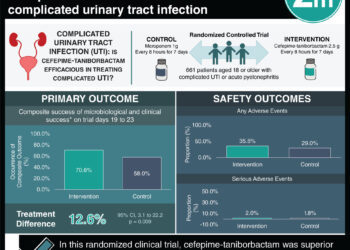Patient Basics: Pyelonephritis
Originally published by Harvard Health.
What Is It?
Pyelonephritis is a kidney infection usually caused by bacteria that have traveled to the kidney from an infection in the bladder.
Women have more bladder infections (also called urinary tract infections) than men because the distance to the bladder from skin, where bacteria normally live, is quite short and direct. However, the infection usually remains in the bladder.
A woman is more likely to develop pyelonephritis when she is pregnant. Pyelonephritis and other forms of urinary tract infection increase the risk of premature delivery.
A man is more likely to develop the problem if his prostate is enlarged, a common condition after age 50. Both men and women are more likely to develop pyelonephritis if they have any of the following conditions:
- An untreated urinary tract infection
- Diabetes
- Nerve problems that affect the bladder
- Kidney stones
- A bladder tumor
- Abnormal backflow of urine from the bladder to the kidneys, called vesicoureteral reflux
- An obstruction related to an abnormal development of the urinary tract
Tests or procedures that involve the insertion of an instrument into the bladder also increase the risk of urinary tract infections and pyelonephritis.
Children sometimes develop pyelonephritis because of an abnormality in the bladder that allows urine there to flow backward (reflux) into the ureter, the connection between the kidney and bladder. This can lead to scarring of the kidney.
Rarely, pyelonephritis is so severe that it is life threatening, especially in older people or in people with an impaired immune system.
Symptoms
The two primary symptoms of pyelonephritis are pain in one flank, the area just beneath the lower ribs in the back, and fever. The pain can travel around the side toward the lower abdomen. There also can be shaking chills and nausea and vomiting. The urine may be cloudy, tinged with blood or unusually strong or foul-smelling. You may need to urinate more often than normal and urinating may be painful or uncomfortable.
Diagnosis
If your doctor is concerned that you have a kidney infection, he or she will ask you about other medical problems, any past infections and your recent symptoms. He or she will check your vital signs (temperature, heart rate, blood pressure), and will press on your abdomen and flanks to see if there is tenderness near the kidney. In women, the symptoms of pyelonephritis may be similar to those of certain sexually transmitted diseases, so your doctor may recommend that you have a pelvic examination.
To diagnose pyelonephritis, your doctor will order urine tests to look for white cells in the urine and for culture to determine the type of bacteria causing the infection. Usually your doctor will also order blood tests. Like the urine, the blood is sent for culture. People with pyelonephritis may have bacteria in their blood as well as their urine. Antibiotics are started prior to the culture results and will be adjusted once the bacterial species is identified in 24 to 48 hours.
Expected Duration
Most patients with uncomplicated cases of pyelonephritis find that their symptoms begin to improve after one to two days of treatment with antibiotics. However, even after symptoms improve, antibiotics are usually prescribed to complete a 10 to 14 day course.
Prevention
To help prevent pyelonephritis if you have had a previous episode or are at risk:
- Drink several glasses of water each day. Water discourages the growth of infection-causing bacteria by flushing out your urinary tract. This flushing also helps to prevent kidney stones, which can increase the risk of pyelonephritis.
- If you are a woman, wipe from front to back. To prevent the spread of intestinal and skin bacteria from the rectum to the urinary tract, women should always wipe toilet tissue from front to the back after having a bowel movement or urinating.
- Decrease the spread of bacteria during sex. Women should urinate after sexual intercourse to flush bacteria from the bladder. Some women who have frequent urinary tract infections after sexual activity can take antibiotics around the time of intercourse to prevent an infection.
If there is a structural problem with the urinary system, such as blockage from a stone, or a developmental abnormality, surgery can be done to restore normal urinary function and prevent future episodes of pyelonephritis.
Treatment
Doctors treat pyelonephritis with antibiotics. In most uncomplicated cases of pyelonephritis, the antibiotic can be given orally (by mouth), and treatment usually lasts for 10 to 14 days. Commonly used oral antibiotics include trimethoprim with sulfamethoxazole (Bactrim and others), ciprofloxacin (Cipro) or levofloxacin (Levaquin), but the choice of antibiotic will depend on your history of allergies and laboratory testing of the bacteria causing the infection. Once you finish the full course of antibiotics, your doctor may ask for another urine sample to check that bacteria are gone.
If you have high fever, shaking chills or severe nausea and vomiting, you are more likely to become dehydrated and may be unable to take oral antibiotics. In that case, you may require hospital treatment so that antibiotics can be given intravenously (into a vein). High fever and shaking chills also may be signs that your kidney infection has spread to your bloodstream and can travel to others parts of your body. If your doctor is concerned that you may have an obstruction (such as a kidney stone that is stuck in the ureter) or a structural abnormality in your urinary system, other tests may be ordered, such as a computed tomography (CT) scan or ultrasound.
When To Call A Professional
Call your doctor immediately if you have symptoms of pyelonephritis (particularly fever and flank pain, with or without urinary symptoms), especially if you are pregnant.
Prognosis
A single episode of uncomplicated pyelonephritis rarely causes permanent kidney damage in an otherwise healthy adult. However, repeated episodes of pyelonephritis can cause chronic (long-lasting) kidney disease in children, people with diabetes, and adults who have structural abnormalities of the urinary tract, or nerve diseases that disrupt bladder function. Pyelonephritis can become chronic if an infection cannot be cleared easily, as in a person with a kidney stone or other developmental abnormality of the urinary system.
Additional Info
National Kidney Foundation
30 East 33rd St.
New York, NY 10016
Phone: (212) 889-2210
Toll-Free: (800) 622-9010
Fax: (212) 689-9261
http://www.kidney.org/
National Institute of Diabetes and Digestive and Kidney Disorders
Office of Communications and Public Liaison
Building 31, Room 9A04
Center Drive, MSC 2560
Bethesda, MD 20892-2560
Phone: (301) 496-3583
Fax: (301) 496-7422
http://www.niddk.nih.gov/








